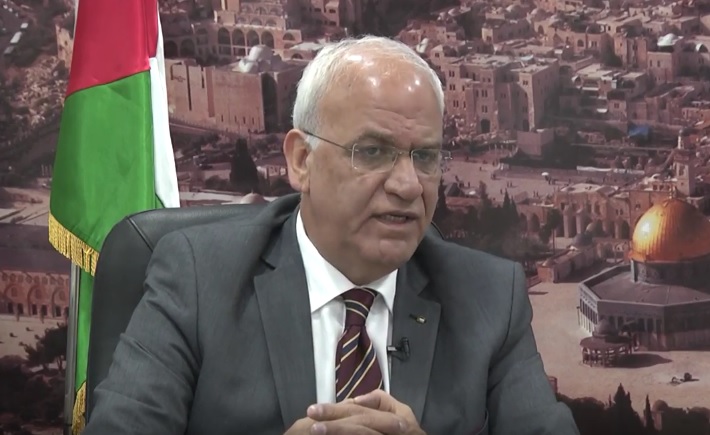
Saeb Erekat, a senior Palestinian diplomat, has said that if the EU “rewarded” Israel with a high-level meeting later this month, it would be helping to “bury” the two-state solution.
“The Israeli government shouldn’t be rewarded for its systematic violations of international humanitarian law. Rather, there must be accountability,” he told EUobserver in an interview.
“Lack of accountability, impunity, is what provides the Israeli government with enough confidence to move ahead with its plan to bury the prospects of the two-state solution,” he said.
Asked when the moment will come when that solution is no longer viable, he said: “We may be witnessing it now.”
The EU foreign service aims to hold an “association council” with Israeli diplomats on 28 February.
The meeting, the first of its kind in five years, is to take place despite the EU’s verbal rebuke of Israel’s plan, announced in January, to build some 6,000 new homes for Jewish settlers on Palestinian land.
More than half a million settlers have already come to live in East Jerusalem and the West Bank since Israel occupied them after a war in 1967.
The EU and the UN have long said the solution to the conflict should be the creation of a Palestinian state alongside Israel on 1967 borders with Jerusalem as their shared capital.
Erekat said the reality on the ground was Israel’s creation of one “apartheid” state that denigrated Palestinian rights, however.
“It’s about theft of land and natural resources. It’s about dividing our families and preventing our economic development. Overall, it’s about the violation of our basic human and national rights,” he said.
He said the EU should “move towards sanctions against Israel”, such as “banning settlement products” from being exported to Europe.
But he said that, behind closed doors, “a few member states have been putting pressure on the EU not to take any action”.
He declined to name them, but the list includes Britain, Hungary, and Lithuania, who vetoed an EU declaration last month that was to have endorsed a new French initiative for Arab-Israeli talks.
“The Netanyahu administration knows that no action will be taken,” Erekat said, referring to Israeli prime minister Benjamin Netanyahu.
Erekat, the secretary general of the Palestinian Liberation Organisation, spoke out on the eve of an EU foreign ministers meeting in Brussels on Monday (6 February).
He also spoke ahead of Netanyahu’s visit to the UK the same day and to the US later this week.
EU ministers are to discuss the latest developments in the Middle East Peace Process, among other topics, including how to stop migrants coming via Libya to Europe.
Erekat said the two issues were linked because the number of Palestinian refugees trying to reach the EU from their camps in Lebanon, Iraq, and Syria was “growing”.
He said this was because they “have been persecuted by terrorist groups”, referring to jihadist groups such as Islamic State.
He also said it was because they had no Palestinian state in which to seek shelter.
“What choice do they have? Hundreds have already died in the Mediterranean Sea [en route to Europe] because Israel doesn’t allow them to go back home,” he said.
About 1 million Palestinian refugees live in Lebanon, Iraq, and Syria.
There are 2 million more Palestinians in Gaza. The UN says the strip will become “unliveable” by 2020 due to Israel’s economic blockade, making them likely to also join the exodus to Europe in greater numbers.
Erekat urged the EU to play a bigger role in the peace process in reaction to Donald Trump’s election in the US.
Trump, a pro-Israeli hawk, has said he might move the US embassy to Israel from Tel Aviv, its UN-recognised capital, to Jerusalem.
The 61-year old Erekat, who was Palestine’s chief negotiator in talks with Israel in the 1990s, said “it has been made clear that the days of an occupier [Israel] negotiating alone with a people under occupation only under US mediation are gone”.
He added that the Jerusalem move “would be a total disaster”.
“This would be the end of an era, probably the end of the two-state solution, or at least the end of any role for Washington in our region.”
He indicated that Palestine might turn to Russia for more help in the absence of EU or US leadership.
“Russia is already playing a very important role,” he told EUobserver.
“I was recently in Moscow and foreign minister [Sergei] Lavrov reaffirmed Russia’s commitment to ending the Israeli occupation, including of East Jerusalem,” he said.
Russia is trying to expand its influence in the Mediterranean, but it remains to be seen if Russian leader Vladimir Putin would put at risk his friendly relations with Trump by challenging Israel.
“Russia has recognised the State of Palestine and we appreciate this gesture. Now it is time to turn their political position into concrete measures on the ground”, Erekat said.